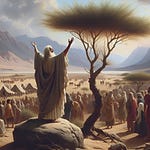What does it take to meet a holy God? In Exodus 19, Israel discovers that the One who carried them on eagles’ wings now calls them to covenantal commitment and consecration.
Commentary
vv. 1–2 - From verses 1–2 we learn that three months to the day after their exodus, the children of Israel arrived at Sinai. The text stresses the timing: “the selfsame day.” Some have observed that this three month anniversary after the Passover ties this event to the timing of Pentecost. The important point to note is that God’s promise to Moses was being fulfilled exactly as He said. At the burning bush the Lord declared, “Ye shall serve God upon this mountain.” Now that word is kept. Israel encamps before the mount—not just any hill, but the mountain of God, where He would descend in fire and call His people into covenant commitment.
vv. 3–6 - From verses 3–6 we hear the covenant proclaimed. God reminds Israel: “Ye have seen what I did unto the Egyptians, and how I bare you on eagles’ wings.” He carried them safely into fellowship with Himself. But God’s redemptive love calls for loyalty even before all the terms are presented: “If ye will obey my voice indeed, and keep my covenant…” Obedience was not the price of redemption but the proof of it. God then gives three titles. First, He calls them “a peculiar treasure” i.e. a royal possession, the kind a king would keep distinct from all his other wealth. Then He calls them “A kingdom of priests” i.e. they were to represent Him before the nations, modeling His holy character and proclaiming His Word. And finally, “An holy nation” i.e. not that they were isolated from the world, but distinct within it. They were to live by His standards, reflecting His purity, showing what it means to belong to Him. The people respond with one voice: “All that the LORD hath spoken we will do.”
vv. 9–15 - From verses 9–15 the scene shifts from covenant to consecration. God tells Moses to prepare the people for His coming. For two days they must wash their garments, set aside ordinary activities, and abstain from marital relations. Not because these were sinful, but because God required them to feel the seriousness of the moment. Holiness is not casual. The outward washing pointed to the inward purity God demands. Boundaries were also set: none were to touch the mountain on pain of death. God is not to be treated lightly. His presence is not random or unstable; but message is that it cannot cohabit with the profane. Only when the heavenly trumpet sounded could the people approach—and even then, only to the foot of the mountain.
vv. 16–19 - From verses 16–19 we see the third day dawn with dread and glory. Morning breaks with thunder, lightning, and a cloud heavy with God’s presence. A trumpet sounds—not from man, but from heaven. The mountain quakes, the people tremble. Moses speaks, and God answers and descends in fire—not to destroy, but to declare His majesty. The people learn that the God who redeemed them is not to be trifled with.
vv. 20–25 - Finally, from verses 20–25 Moses is summoned. God calls him only to send him back with another warning, showing that men are not to force their way into God’s presence. Even priests must first sanctify themselves. So Moses descends again, to stand between God and the people.
Application
Proximity to God demands preparation. The presence of God is not common. He is not ordinary or familiar. He is holy, and when He draws near, it requires something of sinners. Under the Old Covenant, Israel washed garments and set boundaries; under the New Covenant, we still need consecration. “Be ye holy; for I am holy.” When we come before God, we must rightly prepare our thoughts, affections, and worldly cares. Washing clothes reminded Israel to repent. If it is fitting to appear before earthly rulers in clean garments, how much more before the King of kings? Examine yourself: do you rush into worship without preparation? Casual worship is condemned worship.
God brings sinners together as His people. This was not an individual encounter. The congregation washed, waited, and trembled together. They answered as one: “All that the LORD hath spoken we will do.” Holiness has a corporate aspect. Your obedience strengthens the community and your sin pollutes it. Even lawful enjoyments were set aside for a season to give full attention to God, reminding us that He has the right to demand all. May God help all the members of your church and mine to be consecrated wholly to Him.
Man needs a mediator before God. God told Moses, “That the people may hear when I speak with thee, and believe thee for ever.” Moses stood between God and the people, clothed with authority not by personality but by proximity. Christ is the greater Mediator. He ascended not a mountain but heaven itself. He did not just hear God’s voice—He is the Word made flesh. Our safety lies in clinging to Him, who brings us near without destruction.
Those in covenant with God show faith that produces obedience. God said, “If ye will obey my voice… then ye shall be my treasure.” Israel’s covenant privileges were tied to obedience—but obedience had to be mixed with faith (Heb 4:2). The law given at Sinai reflected what was written on Adam’s heart and showed their need of the gospel. It was not a covenant of works for salvation, but an administration of grace pointing to Christ. The law taught Israel to respond to love with love, and to long for the One who would fulfill it perfectly. True faith delights in God’s law: “O how love I thy law! it is my meditation all the day” (Ps 119:97). If you are part of God’s peculiar treasure, His kingdom of priests, and holy nation, you are not to wear these titles merely as honors but responsibilities. They call you to holiness and a godly witness for Christ.
Reverence is always right before God. It’s not just preparation that man needs in God’s presence, it’s a right perspective. Thunder, lightning, cloud, trumpet—these elements produced solemn trembling. Such awe is greatly missing today. When was the last time your worship was marked by reverent fear mingled with delight? Though we have boldness to enter by the blood of Jesus, we must not forget: our God is a consuming fire (Heb 12:28–29). Children, learn to pay attention during worship. Adults, guard against low views of God. If your Christianity feels small, it is not because God has changed, but because your view of Him has shrunk.
“We are in Christ. Who shall be able to rend us from His innermost heart? We are members of His body. Who shall mutilate the Savior? “I bare you,” says God, “as on eagles’ wings.” Who shall smite through the breast of the Eternal One, heaven’s great eagle?” — Charles Spurgeon










